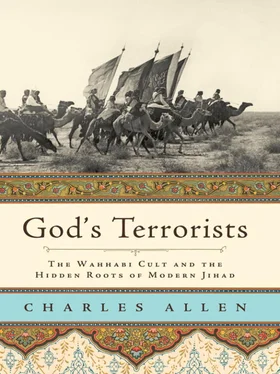Nejd, as Wahhabi
heartland
Jabal
Shammar
unification of tribes, Emir
of, see Ibn Saud New York, World Trade Center
Nicholson, John
Norman, Justice John
North-West Frontier (NWFP),
becomes Province, map
madrassahs in, Bin
Laden’s influence in
North-West Provinces
Nowshera
Nujeeb police
Obaidullah Sindhi, Maulana
Ode of Niyamatulla
oil
O’Kinealy, James
Oman
Omar ibn al-Khattab, Caliph
Omar, Mullah Muhammad
opium
Orakzais
Orissa
Othmani, Maulana Shabbar Ahmad
Ottomans
Wahhabis and, British
policy towards, ‘Arab revolt’
against, dismantling of
Empire
Oude, estates
confiscated
Padri Movement
Pakhtia
Pakistan
madrassahs
border region
emerges as nation-state
involvement in Afghanistan
support for Taliban
Palam Mullah
Palestine
Palgrave, William Gifford
Pamir mountains
Panipat
Panipati, Maulvi Qasim
Paris Conference
Parsons, Captain, Q. D.
Pashtu
Pathans
Pakhtunwali laws
partition of tribal lands
and Wahhabis under Syed Ahmad
loya jirgas
nang-i-Pukhatna code
nanawati code, at
Ambeyla, under influence of
mullahs, join Party of
Volunteers, political
developments, and
Afghanistan
refugees, shura in Kandahar
xenophobia, support for
Bin Laden
Patna, as centre for Wahhabis
Patna – cont
Sadiqpore district
‘Patna-ites’
chota godown
during
Sepoy Mutiny
Wahhabi
leadership arrested
Wahhabi leaders released
and Wahhabi trials
Patriotic Association
Pelly, Lieutenant-Colonel Lewis
Pennell, Dr Theodore
Pentagon
Persia
Persian
Persian Gulf
Persians
Peshawar
modern city, under
Sikh rule, during Sepoy Mutiny
Christian
cemetery, and war against
Pathans, head of Syed
Ahmad displayed, base for
British action
Edwardes College established
authorities’ response to
Frontier developments
and volunteer movement
Maktab al-Khidamat
(Services Offices)
madrassahs, Bait al-Ansar
(House of Ansar), Bin
Laden arrives, Al-Zawahri
arrives, Al-Zarqawi arrives
Peshawar Gazetteer
Philby, Harry St John
conversion to Islam
Philippines
Pindari freebooters
Pioneer
Pir Ali Khan
Pir Baba
pirs
Plassey, battle of
Pollock, Frederick
Powindah, Mullah
Prem Singh, Sepoy
print medium
Punjab, under
Sikh rule, Settled
Areas, Tribal Areas, North
West Frontier
appearance of
mujahedeen, becomes British
province, during Sepoy
Mutiny, Hijrat
Movement in, madrassahs in
Punjab Frontier Force
Punjtar
Puritanism
Qais bin Rashid
Qasoori Sahib
Queen’s Own Corps of Guides
Cavalry and Infantry
Qum
Quran
instruction in madrasssahs
teachers of, translated into
Persian, literal interpretation of
and sharia, Wahhabite
interpretation of
requirement for zakat
contradictions within
nonviolent verses, ‘Verse of the Sword’, and British rule in India, motto from, Kalma
and influence of Western
knowledge, command to
kill unbelievers, corruption by
Persians, and innovation
Qutb, Muhammad
Qutb, Sayyid
Rae Bareli
Raffles, Stamford
Rajasthan
Rajputs
Rangoon
Ranigunge
Ranjit Singh, Maharaja
Rashid, Ahmed
Rattray, Captain Thomas
Rattray, Lieutenant Harry
Ravenshaw, T. E.
Rawalpindi
Red Sea
Reily, J. H.
Ripon, Lord
Risala Jihad
Riyadh
Britons in Wahhabi
stronghold
Philby establishes political agency
Institute of Religious
Studies, King al-Saud University
Roberts, Major (later Major-General)
Frederick ‘Bobs’
Rohilkhand
Roman Catholicism
Rose, Sir Hugh
Routledge, James
Rowcroft, George
Rowlatt Acts
Russia
Russians, Soviet involvement in Afghanistan
Ruthven, Malise
Sadat, President
Sadullah, Mullah
(’the Mad Fakir’)
Safed Koh range
Said Akbar, Akhundzada
Saiyyeds
Salafi
Samaratut Tarbiyat (Results of the Training)
Samiul Haq
Samuells, Edward
Sang-i-Hisar madrassah
Sarfaraz Ali, Maulvi
Saud, House of
Saud-Wahhabi dynasty
Saudi Arabia, falls
under Saud-Wahhabi rule
Wahhabism institutionalised
established as nation-state
wealth
involvement in Afghanistan
funds madrassahs, Grand
Mufti of, disenchantment with
House of Saud, recognises
Taliban government
Sayed Shari Mohamed
Sayyaf, Abdul Rab Rasoul
Sayyed Akbar Shah
Sayyed clan
allied with
Wahhabis
Sayyed Firoze Shah
Sayyed Mubarik Shah
Sayyed Umar Shah
Sayyid Abulala Mawdudi
Sayyid Jamal al-Din al-Afghani (‘the Afghan’)
Sayyid Muhammad
Sayyid Nazir Husain Muhaddith
Maulana
Scindia, Daulat Rao
Second World War
Sepoy Mutiny
Wahhabis
and, effect
on British perceptions
Seringaputam
Shabkadar
Shafi, Muhammad
Shahabad
shahid
Shakespear, William
Shamlee, mosque
Shankargarh
sharia
Wahhabi
immutability of, itjihad , in
Saudi Arabia, in Pakistan
Taliban
Shariat-i-Mohammadi (Movement for the Enforcement of Islamic Law)
Shariatullah, Hajji
Sharif Husayn ibn Ali
Sheikh al-Islam
Sher Ali, Amir
Shere Ali
Shia theology, belief in mahdi , and title of imam
mam-Mahdi story, prophecies
Shias, Mughals
hostility towards
and cult of
martyrdom, and desecration of
Prophet’s tomb, response to
Wahhabi trials, Hazaras
madrassahs, ayatollahs
Shinwaris
Shuja, Amir Shah
Siddiq Hasan Khan, Nawab
Sikander, Shah
Sikhs, war
against Pathans
Wahhabi hostility towards
imperialism, and Sepoy Mutiny
barracked in Jamma
Masjid, at Ambeyla
maharajas
at Malakand, at Dargai, salute
George V
Silk Gorge
Silk Letter Conspiracy Case
Sindh
Singesar
Sipahi-e-Sahaba (Soldiers of the Companions)
Sirat-ul-Mustaqim
Sirhindi, Sheikh Ahmad
Sittana
Wahhabi build-up and
expulsion
burra godown
as base for jihad
during Sepoy Mutiny
Six Day War (1967)
socialism
Somalia
South Africa
Soviet Union, see Russians Special Police Department
Spin Ghar mountains
St Bartholomew’s Eve Massacre
Standard Oil company
Sudan
Sudi Badal
Suez, Canal
Sufis, saints
Sufism, Naqshbandi, mysticism, prophecies
Suleiman the Magnificent
Sultan, Prince
Sumatra
Sunni theology, Hanafi
school
Hanbali school
taqlid, Shafi school
revival, al-Sunna, belief
in mahdi, revivalist
prophecies, fatwas on British
rule, increasing
conservatism, Alawite
sect
Sunnis, Wahhabi
hostility towards, shocked
by desecration of Prophet’s tomb
Bohra sect, mullahs
denounce Wahhabis
fundamentalist, response
to Wahhabi trials, denounce
Deobandis, promotion of
Wahhabism to, and Islamic
revival,
Supreme Committee for Islamic
Читать дальше












